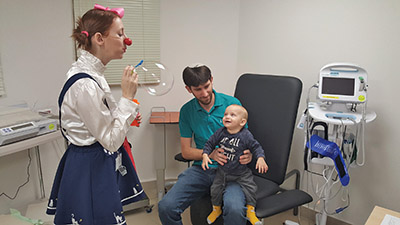
Illness is no laughing matter. But for sick kids around Israel, laughter is the best medicine.
It’s an emotionally draining scenario that unfortunately plays itself out in hospitals across the USA and Israel each and every year. Hundreds of sick children find themselves marooned in their hospital beds during the Jewish holidays, while friends and family members are out celebrating. The antidote to their anxiety, anger and frustrations doesn’t come in the form of a “chill pill” or sedation, but rather a medical clown, who provides not only a smile but a variety of well-thought-out therapeutic exercises to turn a child’s frustrated frown into a smile.
Medical clowning has become an integral part of the therapeutic process, especially in children’s wards. At Sheba Medical Center, the largest hospital facility in Israel, located in metro Tel Aviv, 10 medical clowns who are associated with the Dream Doctors organization work diligently throughout the year and especially during the holidays to ease the physical and emotional traumas of children.
“Our medical clowns circulate through many departments, from the neonatal care unit to the emergency room, radiation and hemo-oncology (cancer) divisions. Many of our medical clowns have established real relationships with kids who might be in the hospital for weeks and months,” said Hagit Shpigel, director of administration at Sheba’s Edmond and Lily Safra Children’s Hospital.
The Dream Doctors clowns highlight a diverse background in the dramatic arts and undergo special training in order to work in big city hospitals such as Sheba Medical Center. Iris Lia Sofer, a professional actress who is known by her medical clown moniker, “Olive,” added, “We undergo special courses to deal with different types of situations, such as sedation. We need to know how the procedures will affect the child’s personality. There is a psychology we need to employ when it comes to a child and his/her parents dealing with pain. We are also taught how to deal with a child in a first encounter. Remember, a child is scared to be in the hospital in the first place so we need to befriend the parents and monitor how the child reacts.”
Because Olive has several years of experience in the field, she doesn’t get excited when a child reacts in an off-beat and even angry manner towards her. “We are not just there to smile and laugh, nor are we singers and jugglers, even though many of us come from a theatrical background. Our job is to help a child get rid of their anger of being sick,” she revealed. “I deal with many kids in the cancer division. Many of them are quite angry because they don’t want to do chemotherapy. In one instance, there was a kid who enjoyed throwing me out of the room. Then I’d come back again and have him throw me out again. He enjoyed it. But at the end of the day, I gave him a chance to transfer his anger.”
These “human” encounters are vital to recovery. From the beginning of medical training, doctors in Israel are taught to value the importance of medical clowns in the healing process.
“A positive atmosphere and good bedside mannerisms are instrumental components to validate the concerns of patients and foster effective communication and empathy,” explained Dr. Robert Lubin, managing director of Technion’s American Medical School program.
Purim is an especially difficult time to be laid up in a hospital bed. But at Sheba Medical Center, every sick child gets a healthy dose of personalized attention, not necessarily from the medical clowns.
“Davka, during Purim, we actually take a small step back because so many people want to put a smile on a child’s face,” Olive divulged. “Last year, I came dressed as a bride but I was not the main attraction because so many people from the Israeli community, including local firemen, sports stars, hi-tech entrepreneurs and celebrities came to visit on Purim. They literally came with suitcases full of goodies, presents, candies etc. It’s such a special day that puts a smile on the kids’ faces and offers a sense of relief and hope for the parents.”
By Catherine Green









